 ... the product multiply the number of tens by one more than itself for the hundreds, and place the product of the units at the right of this product, for the tens and units. Thus... ... the product multiply the number of tens by one more than itself for the hundreds, and place the product of the units at the right of this product, for the tens and units. Thus...  Elements of Algebra - Page 5by Bourdon (M., Louis Pierre Marie) - 1831 - 304 pagesFull view Elements of Algebra - Page 5by Bourdon (M., Louis Pierre Marie) - 1831 - 304 pagesFull view - About this book
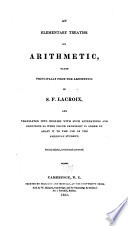 | Leonhard Euler - Algebra - 1821 - 380 pages
...determinate numbers ; so that the above example will furnish the following theorem; viz; The product of the sum of two numbers, multiplied by their difference, is equal to the difference of the squares of those numbers. This theorem may be expressed thus : (a + 6) X (a — 6) = aa — 66. And from this,... | |
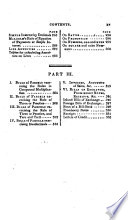 | Thomas Keith - Arithmetic - 1822 - 354 pages
...differing by an uuiti is equal to the difference of the sijimm of those numbers. . 4. The sum of any two numbers, multiplied by their difference, is equal to the difference of the squares of the same numbers. 5. The sum of any two numbers will measure the sum of their cubes ; and the difference... | |
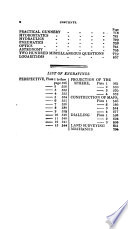 | Peter Nicholson - Mathematics - 1825 - 1046 pages
...squares, together with twice their product. From Example 2 we hare another (32.) THEOREM. The product of the sum of two numbers -multiplied by their difference, is equal to the difference of the squares of those numbers. And from this may be derived a third (33.) ТНВОДЕМ. The difference of two... | |
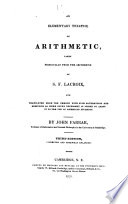 | Silvestre François Lacroix - Arithmetic - 1825 - 394 pages
...determinate numbers ; so that the above example will furnish the following theorem ; viz. The product of the sum of two numbers, multiplied by their difference, is equal to the difference of the squares of those numbers. This theorem may be expressed thus : (a + b) X (a — b) =. aa — bb. And from this... | |
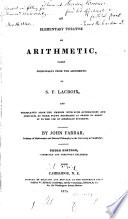 | Silvestre François Lacroix - Arithmetic - 1825 - 404 pages
...determinate numbers; so that the above example will furnish the following theorem ; viz. The product of the sum of two numbers, multiplied by their difference, is equal to the difference of the squares of those numbers. This theorem may be expressed thus : (a + 6) x (a — 6) = oa — 66. And from this,... | |
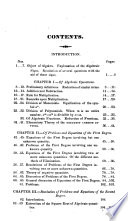 | Bourdon (M., Louis Pierre Marie) - Algebra - 1831 - 446 pages
...comprehending the solutions of all questions of the same nature, the enunciations of which differ only in the numerical values of the given quantities. Second...THEOREM. 5. The sum of two numbers, multiplied by their differenc"gives for a product the difference of their squares, or secf powers. Thus, let 12 and 9 be... | |
 | Education - 1835 - 402 pages
...other. For example, the formula (a + 6) x (a - 6) = axa — bxb, which in common algebra expresses that the sum of two numbers multiplied by their difference is equal to the difference of their squares, will now be a compendious representation of the following geometrical theorem : —... | |
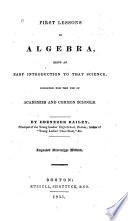 | Ebenezer Bailey - Algebra - 1835 - 258 pages
...a? + ab — ab — b* Their product, a2 * — V. To express this formula in words : The product of the sum of two numbers, multiplied by their difference, is equal to the difference of their second powers. 10. Multiply 9 -f- 7 by 9 — 7, according to this rule. 11. Multiply 12 + 8 by... | |
 | Joseph Gwilt - Architects - 1842 - 1114 pages
...be substituted, so that out of the above examples arises the following theorem ; viz. the product of the sum of two numbers multiplied by their difference is equal to the difference of the squares of those numbers ; which may be thus expressed — (a +b) x (a — b) — aa— bb From this last follows... | |
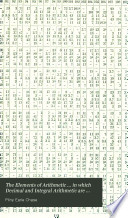 | Pliny Earle Chase - 1844 - 258 pages
...4X5=20, and 43X47=2021; 42X48=2016; 44 X 46=2024 ; 7 X 8=56, and 72 X 78=5616 ; 71 X 79=5609, &c. (12.) The sum of two numbers multiplied by their difference, is equal to the difference of their squares. Hence we may readily find the product of two numbers, one of which is as much above... | |
| |